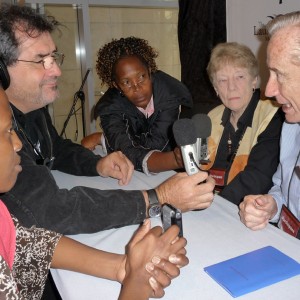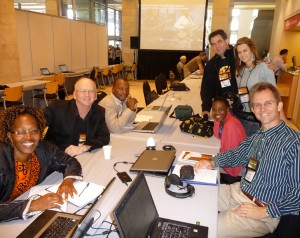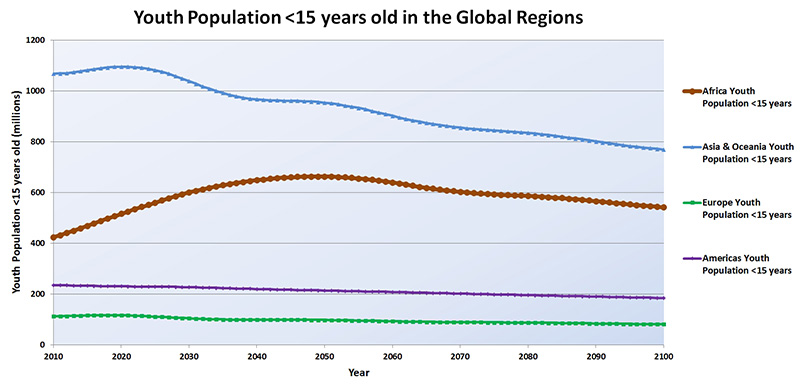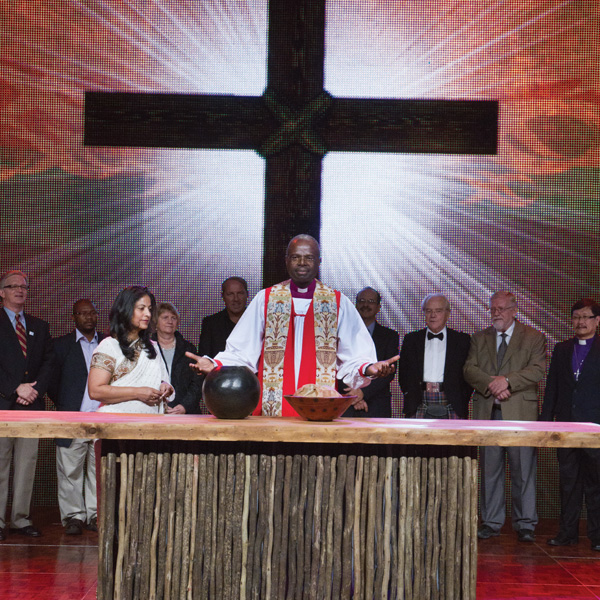Leaders are wise to take time regularly to focus on identifying and understanding the key issues for the global role of the church. The Third Lausanne Congress on World Evangelisation held in Cape Town in 2010 was such a time of identifying and processing these critical issues. People on the hosting continent of Africa were grappling with these key issues, and are now continuing to define the next key issues for moving forward towards 2050.
How Jesus addressed the critical issues
During the last evening of his life on earth, Jesus took time to be with his very close friends. He talked with them about the key issues they would be facing in the time ahead and helped them to prepare. He prayed not just for them alone, but said: ‘I pray also for those who will believe in me through their message’ (John 17:20).[1] Until today, people around the world are sharing this message. Even today, the followers need to discern the key issues of the day to remain focused on what is really important up ahead.
Key issues in 2010
In preparation for Cape Town 2010, over 30 issues were identified for discussion by Christian leaders from around the world. These included witnessing to the truth of Christ, bringing peace to suffering people, and living out of love among people of other faiths. Also addressed were important strategies for world evangelisation, calling the church to integrity, and partnering in unity in mission.
In Africa, media leaders realised that these issues were far too important for only the 4,500 global delegates at the conference to discuss. In many geographical areas the online global conversation was not accessible. The issues were thus addressed using radio programmes. They helped Christian leaders to become aware of the key topics. The leaders were then encouraged to discuss the global issues and challenges with their ministry teams.
Media approach during and after Cape Town
Media professionals from various global regions worked together to bring the stories of the Lausanne Congress to people through the media.[2] An African radio team was formed with team members from radio ministries across the continent of Africa. The short radio programmes they produced focused on helping the wider church become involved in the conversation.

Beyond the conference for another whole year the media messages were distributed to radio stations across the continent of Africa. Through the medium of radio, Christian leaders were therefore able to engage in these key issues for a longer period and over a large area.
Subsequently, the Lausanne Global Consultation on Media and the Gospel[3] was convened in 2013 to expand on the three main facets of globalised media addressed in The Cape Town Commitment:[4]
- Media awareness to guide Christians in engaging critically with the media around them
- Media presence to motivate Christians to play a pro-active role in the mainstream media
- Media ministries to motivate various types of media to be used collaboratively for communicating the gospel[5]
Media engagement in Africa
Media networks in Africa have been adopting these media priorities within their core activities:
- The Association of Christian Media[6] (southern Africa) has intentionally involved church leaders in utilising media, and has reached out to Christians working in the mainstream media.
- The Africa by Radio[7] network has integrated the Lausanne media priorities into the key directions for media across the continent of Africa.

These clearly defined focus areas for media from Cape Town 2010 are nowadays being lived out through the media networks over Africa through various local media partners. Helpful resources are now available through the online resources of the Lausanne Media Engagement Network.[8]
The impact of Cape Town 2010 in Africa can be seen five years later through such media networks. There is growing collaboration between the media and Christian leaders to speak into the key issues of the day together, whether at the community or national level. What are these key issues that need to be addressed?
Reaching African youth
In the coming decades leading up to 2050, the African population is expected to double from the present 1.1 billion to around 2.2 billion people.[9] During this phase, the African youth population will be the largest ever in the whole lifetime of humanity. In other global regions the number of youths has already begun declining or will be declining very soon. The African youth population under 15 years of age is at present 468 million and still growing fast. Only by 2050 will it reach the peak of 663 million youth, after which the number is expected to decline.
For the next 35 years there is the opportunity to reach the greatest ever number of African youth with the love of Christ. This great strategic opportunity can easily be missed. Who will join together towards helping this large youth population find hope and become the next generation of ambassadors for Christ?

Focus on other key issues in Africa
Why is it so important to continue focusing on the key issues? Christian leaders grow insight as they continually aim in the appropriate direction, adjust during times of change, move through times of crises, and become ready for suitable opportunities. By interacting with one another, the strategic directions for moving ahead can be defined more clearly.
For Lausanne in Africa, it is helpful to identify the critical issues for the next 35 years towards 2050. By bringing the Lausanne issue networks alongside the key issues in Africa, further expertise becomes available to grapple with what is important. Furthermore, issue experts in Africa can be drawn in to contribute insight from the local context.
In discerning the issues of the times, leaders in Africa also want to help leaders in other regions, who in turn can interact with them around the issues in Africa.
Building a skilful community for future tasks
Individuals and organisations bring different expertise, experience, and insights. When these come together, new ministries can develop. The biblical narrative of the building of the Tabernacle shows that many skilled people were needed: ‘The Lord has chosen Bezalel, and he has filled him with the Spirit of God, with skill, ability, and knowledge in all kinds of crafts.’ For the building, ‘every skilled person’ was called to join in, everyone ‘who was willing to come and do the work’. Once construction started, ‘all the skilled men among the workmen made the tabernacle’ (Exod 35:30-36:8). As Jesus calls people to follow him and ‘make disciples of all nations’ (Matt 28:19), many people with different skills and abilities are needed for building a beautiful expanded community that will honour God.
Ten key priorities
The Lausanne EPSA Leadership Consultation in July 2015 identified ten priorities to focus on in Africa moving towards 2050:[10]
- Intentionally mentoring younger African leaders to develop a missional world perspective.
- Leveraging the current increasing urbanisation in Africa through influencing leaders and city missions.
- Proclaiming the uniqueness of Christ amidst religious extremism, syncretism, and pluralism.
- Building on previous mission efforts to evangelise Africa’s Unreached People Groups.
- Using technological media in missions to equip and mobilise the young Christian population.
- Developing a theology of Christian suffering, authentic spirituality, responsible stewardship and biblical sexuality that are integral to moral education and discipleship.
- Strategically engaging and equipping the African Diaspora for pro-active evangelism and world missions within their specific global context.
- Protecting vulnerable women, children and youth, and empowering them for involvement in church life and missions.
- Nurturing the significant relationships within the Lausanne Movement towards strategic partnerships for evangelism, societal transformation, and global mission.
- Developing a contextual Cape Town Commitment Study Guide to resource Christian leaders to engage with the key issues of the mission of the church in the African context.
As Christians rally around these focus areas, capacity will develop towards addressing the Great Commission together.
Moving ahead together
There are both exciting and daunting times ahead. The next 35 years from 2015 to 2050 are critical in providing the most strategic ‘windows of opportunity and challenge’ for Africa. The Lausanne Movement, as a catalyst for significant mission partnerships, should give priority to intentional holistic discipleship in Africa, developing deep-rooted, mature followers and witnesses of Christ in the church; to transformational biblical engagement of society; and to raising Christ-like leaders from Africa for global mission. Identifying and moving with the key issues can enable Christians in Africa and beyond to work closely together in order to live out the life that Jesus demonstrated for his disciples to follow.
Endnotes
- All Scripture passages are from the New International Version (NIV) unless otherwise noted.
- For details about Cape Town 2010 as a communications event, see: Julia Cameron and Lars Dahle, ‘Communicating Lausanne—Yesterday, Today and Tomorrow’, in Lars Dahle, Margunn Serigstad Dahle, and Knud Jørgensen, eds, The Lausanne Movement: A Range of Perspectives (Oxford: Regnum Books International, 2014), pp 104-111. Retrieved from http://www.ocms.ac.uk/regnum/downloads/The_Lausanne_Movement-Final-WMF.pdf
- Media and the Gospel in a Globalized World: A Call to Action from the Lausanne Global Consultation on Media and the Gospel, (Brea, California, USA: Lausanne Movement, 2013). Retrieved from http://engagingmedia.info/media-and-the-gospel-in-a-globalized-world.
- ‘Truth and the Globalized Media’, in The Cape Town Commitment (Cape Town: Lausanne Movement, 2010), section IIA-4. Retrieved from lausanne.org/content/ctc/ctcommitment#p2-1-4.
- Lars Dahle, ‘Media Engagement: A global missiological task’, Lausanne Global Analysis, (2014), Vol 3, Issue 1. Retrieved from https://lausanne.org/content/lga/2014-01/media-engagement-a-global-missiological-task.
- See www.acm.org.za. Also http://christianbroadcasters.co.za/index.php/about-us/vision-mission: ‘The Association of Christian Media (ACM) inspires, serves and supports Christian media in Southern Africa. The ACM strives to foster efficient, effective and sustainable Christian Media organizations and a greater representation of the Christian worldview in secular media. The ACM’s ultimate vision is to communicate the gospel message of hope so that people come to faith in Christ and communities are transformed.’
- Africa by Radio (AbR) aims to encourage radio ministries, churches, and mission organisations to co-operate on a deeper level. Also Africa by Radio acts as a catalyst for the church, related ministries, and mission organisations to engage communities around them in a culturally sensitive and relevant way using the tool of radio broadcasting. See paragraph 11, ‘Radio and Church/Mission’, in Actions on Strategic Issues at www.africabyradio.org/en/our-vision.
- http://engagingmedia.info and www.facebook.com/EngagingMedia
- The figures of the global population and the African youth were obtained using the International Futures Model (IFs). These references provide insight to the IFs: (1) J Cilliers, B Hughes, and J Moyer, African Futures 2050: The next forty years, Monograph 175, (Institute for Security Studies, 2011). Retrieved from http://www.ifs.du.edu/assets/documents/African_Futures_Project_Africa_2050.pdf. (2) B Hughes, et al, International Futures (IFs) Training Manual, (Frederick S Pardee Center for IFs, Josef Korbel School of International Studies, University of Denver, 2013). Retrieved from www.ifs.du.edu. (3) B Hughes and E Hillebrand, Exploring and Shaping International Futures, (Boulder, Colorado: Paradigm Press, 2006).
- The summary list of ten key priorities emerged at the Lausanne EPSA Leadership Consultation held at the African Enterprise Centre in Pietermaritzburg, 1-3 July 2015, to guide the strategy of the Lausanne Movement in the EPS (English, Portuguese, Spanish speaking) Africa region in the coming years.
*Editor’s Note: The two images of the African Radio Team at Cape Town 2010 and the graph are courtesy of the author.

